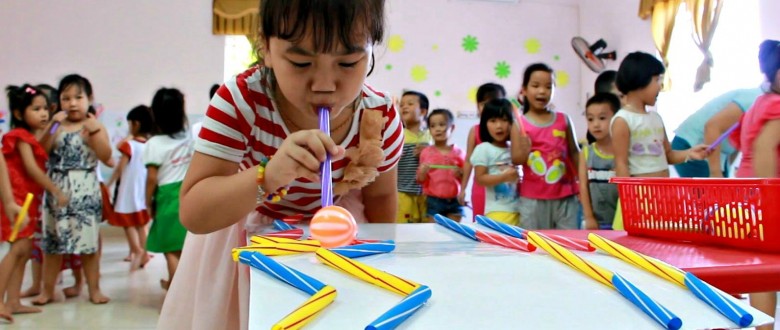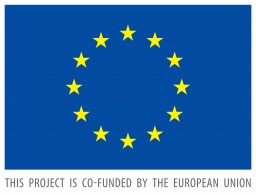
In a new project co-funded by the European Union, VVOB and the Research Center for Gender, Family and Environment in Development are working with the Vietnamese government to put gender-responsive play-based learning into practice both in preschools and at home. With this pedagogical approach, the project – dubbed ‘GENTLE’ – intervenes at a crucial moment in a child’s development and contributes positively to their identities, relationships and self-esteem.
Shatter limited thinking
A study by the government of Vietnam and the UN showed that more than half of women in Vietnam – 58 per cent – had suffered domestic violence at least once in their lifetime, whether physical, sexual or emotional. What is more, the study found that women are three times more likely to be abused by a husband than by any other person.
“This type of violence is, with few exceptions, linked to the way women and men perceive their roles and relationships in both the family household and society at large”, says VVOB Programme Manager in Vietnam Wouter Boesman.
Persisting stereotypes linked to gender create unequal relationships between husbands and wives. “Very young children growing up in such households are heavily influenced by this phenomenon”, Wouter continues. “For example, girls growing up in abusive households are more likely to accept their husband’s violent behaviours as ‘normal’ in later life. Without proper guidance in a different powerful learning environment, such as the classroom, children internalise stereotypes.”
With our latest project in Vietnam, Gender-responsive teaching and learning in the early years (GENTLE), VVOB is joining forces with the Research Center for Gender, Family and Environment in Development (CGFED), a national organisation committed to gender equality in Vietnam. Together, the organisations will empower schools and the government in shattering limited stereotypical thinking both at school and at home.

Sex vs. gender
Sex is a biological trait at birth, while gender is a social construct made up of stereotypes assigned to people from a certain sex. ‘Girls are sweet, boys are tough’ is one such example, but a less innocent one may sound like this: ‘Boys lead, girls follow’.
Pinpointing the exact age when children become self-aware about which sex they are is a difficult task. But experts do agree that somewhere between the early ages of 3 and 5, children develop a strong sense of which gender they (should) belong to, and thus which gender rules they (should) abide by.
Gender stereotypes seriously limit children’s freedom of choosing who they want to be and what they want to do. A recent survey by VVOB for example features the story of one teacher whose brother was actively discouraged by their parents to pursue a teaching career too. In Vietnam, the teachers taskforce is overwhelmingly female.
That’s not fair. Girls are just as tough as boys, boys just as sweet as girls. And women are equally good leaders as men, just as men are equally good teachers as women. But first they need to believe themselves that this is the case, and that’s where a powerful school environment comes in.
GENTLE in a nutshell
So, what will GENTLE’s role be in this?
The project transforms 15 preschools (one per district) in two provinces of central Vietnam into models of gender-responsive play-based learning, involving parents – and fathers in particular – to the fullest in the process. School leaders and teachers of all 156 preschools in the 15 districts are targeted in the whole of the project.
You can find all the technical specifications of GENTLE and more info about our capacity development approach here.
Preschools are powerful environments where young children of that impressionable age spend a lot of their time, says Programme Manager Wouter Boesman: “By focussing on the early years of schooling, we show young children they have choices that go beyond the typical gender-roles they’re often confronted with at home.”
The project lays the foundations for replication and upscaling. GENTLE is built on four pillars:
- The development of a toolkit for gender-responsive learning;
- Capacity development of preschool teachers, school leaders and government staff for implementing gender-responsive learning in all 156 preschools;
- A parent-school sensitisation model on gender-responsive learning;
- An advocacy campaign to make gender-responsive learning part of the nationwide in-service curriculum for preschools.
The toolkit, which includes a training manual, is central. It serves as the main tool in the capacity development for school leaders and teachers in both the 15 model schools and the non-model schools, and of local government staff. The toolkit also contains guidelines to reach out to parents. In other words, the toolkit is the project’s roadmap and builds stakeholder consensus at various levels.
At home and school
“Schools will be capacitated to break the stereotypical male-female gender relationship”, Wouter goes more in detail about GENTLE. “If confronted in textbooks with typical depictions of boys as workers or breaking the rules while girls fulfil the softer, care-giving professions, teachers can use that as a teaching opportunity for their learners.”
“The project also works with fathers and mothers on stereotypical thinking and how that impacts their children. If their kids bring those thinking patterns to school, the teachers can then challenge them and increase the children’s self-confidence”, Wouter says.
In many households, parents divide housework up stereotypically: girls clean, boys fix things. Boys are encouraged to be wild, while girls are discouraged to leave home. Often parents do this unconsciously, they want to treat all their children fairly. It boils down to a lack of awareness of how they perpetuate stereotypes.
“Teachers are figures of authority in Vietnam that can challenge toxic gender stereotypes and eventually break unequal power relations”, Wouter concludes.







